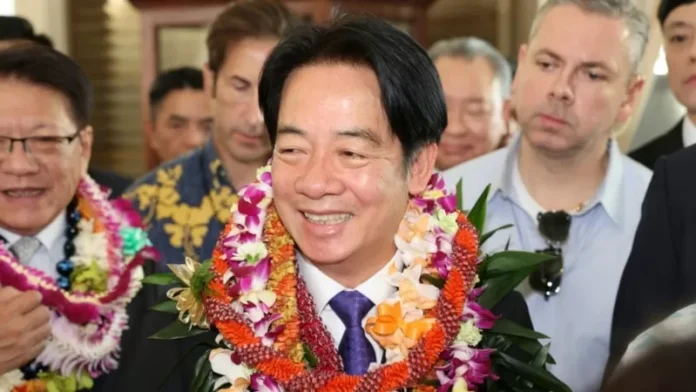BEIJING — China has called on the United States to stop sending wrong signals over Taiwan, following the news that Republican U.S. House Speaker Mike Johnson had a call with Taiwan’s President Lai Ching-te.
The call took place while Lai was visiting the American territory of Guam during a Pacific tour that has angered China. Taiwan’s Presidential Office confirmed the call on Thursday, but did not provide details of the discussion.
Beijing considers Taiwan as part of its territory and has not ruled out the use of force to bring the self-governed island under its control. In response to the call, China’s foreign ministry urged the U.S. to “deliver on the promises of American leaders not to support Taiwan independence, to stop interfering in China’s internal affairs, and to stop sending wrong signals to Taiwan separatist forces.”
Spokesperson Lin Jian emphasized the seriousness of the issue, stating that the U.S. should “clearly recognize the serious danger that separatist acts of Taiwan independence pose to peace and security across the Taiwan Strait.” He also stressed that the Taiwan issue is a core interest of China and that the country will take “resolute and effective measures” to defend its sovereignty.
It is worth noting that the United States does not have official diplomatic ties with Taiwan, but has an arrangement to provide the island with the means to defend itself. However, China’s foreign ministry announced on Thursday that it will impose sanctions on U.S. companies and individuals for selling arms to Taiwan.
The sanctions target 13 firms engaged in the production of drones, unmanned aerial systems, and other military products. They also cover six top executives at companies including Raytheon and BAE Systems. According to the statement, the sanctioned companies will have their assets in China frozen and will be banned from trading with Chinese firms. The executives will also be prohibited from entering China, including Hong Kong and Macau.
This move by China is seen as a strong response to the U.S.’s continued support for Taiwan, which has been a source of tension between the two countries. The U.S. has maintained its stance on providing Taiwan with the means to defend itself, citing the island’s strategic importance in the region.
However, China sees this as a threat to its sovereignty and has repeatedly expressed its opposition to any interference in its internal affairs. The recent call between Johnson and Lai has only added fuel to the fire, with China warning the U.S. to not cross its red line on the Taiwan issue.
The U.S. has yet to respond to China’s sanctions, but it is clear that tensions between the two countries are on the rise. As the world’s two largest economies, it is crucial for China and the U.S. to maintain a stable and cooperative relationship. However, this can only be achieved through mutual respect and understanding of each other’s core interests.
China has always maintained that Taiwan is an inseparable part of its territory and any attempt to support its independence will not be tolerated. The U.S. must recognize this and refrain from sending wrong signals that could further escalate tensions in the region.
It is also important for Taiwan to understand the sensitivity of the issue and refrain from any actions that could be seen as a move towards independence. As a self-governed island, Taiwan must also respect the One China policy and work towards finding a peaceful resolution to the Taiwan issue.
In conclusion, it is crucial for the U.S. and China to engage in constructive dialogue and find common ground on the Taiwan issue. Provocative actions and statements will only lead to further tensions and instability in the region. It is time for both countries to put aside their differences and work towards a mutually beneficial relationship.

